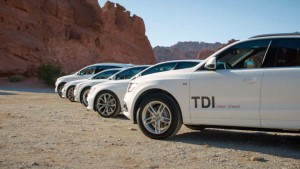After initially denying charges leveled by the U.S. Environmental Protection Agency, Volkswagen told regulators today that the company did, indeed, also cheat on emissions tests involving a second turbodiesel engine.
The concession covers an additional 75,000 vehicles using a 3.0-liter turbodiesel, on top of the 482,000 vehicles equipped with a 2.0-liter diesel called out by the EPA in mid-September for using a so-called “defeat device.” The latest problem involves products sold by both the VW and Audi brands and, for the first time, the Porsche marque, as well.
In the case of the 2.0-liter diesels first cited by the EPA for cheating in September, VW used hidden software code capable of detecting when the vehicles were undergoing emissions tests. With the 3.0-liter system, the diesel engines were improperly fitted with what a spokesman called auxiliary emissions controls.
(Facing massive fines, legal bills, VW slashes capital spending. Click Here for this breaking story.)
It is unclear if the technology surreptitiously fitted onto the 3.0-liter diesel resulted in the same massive increase in emissions such as oxides of nitrogen as with the smaller engine. On the 2.0-liter package, the illegal software would activate more stringent pollution control systems only if it determined an emissions test was underway. At other times, they were permitted to emit up to 40 times the legal pollution limit.
An official from Volkswagen was not immediately available, but spokesman Brad Stertz previously told TheDetroitBureau.com that VW was using technology designed to warm parts of the exhaust system, ostensibly to reduce emissions, since such components as catalytic converters work better when warm. Stertz told the Reuters news service on Friday that the maker failed to “properly notify regulators” it was using the additional controls – which are legal in Europe.
The meeting between VW and the EPA was initially intended to review a proposed fix for the problem with the 2.0-liter diesel. While the maker has said it will begin repairs in January for the nearly 11 million vehicles with the small diesel sold in other markets, it cannot begin to fix the U.S. models without EPA permission.
There has been speculation that might require significant effort, perhaps even including the installation of addition hardware. But Stertz said the focus was on “reprograming” engine control systems, something that would be relatively inexpensive.
(VW, Audi officials apologizes again, try to move past diesel scandal in L.A. For more, Click Here.)
Separately, a report in the German magazine Wirtschaftswoche said the fixes for a 1.6-liter version of the diesel engine sold outside the U.S. could cost as little as 10 Euros, or around $10.74, for a sensor to be added inside the air filter. A software update would also be needed.
It appears VW may need to “reflash” its software on the 3.0-liter diesel, as well.
The automaker faces a potential fine of $18 billion for violating the U.S. Clean Air act on the 2.0-liter turbodiesel. It could run up a fine of $3.2 billion more for cheating on the 3.0-liter powertrain. It also faces potential sanctions by the U.S. Justice Department, along with numerous suits by owners of its diesel vehicles.
(Battery-cars could soon generate 25% of Audi’s U.S. sales. Click Here for the story.)



It sounds like the EPA is blackmailing VW to save face since independent testing of the 3.0L V6 diesel engines by the German motor authority KBA shows no illegal software and no “defeat device” on the 3.0L VW/Audi/Porsche engines. The fact that the EPA didn’t even understand that VW was using a legal and common industry diesel hot CAT cleaning cycle on cold start ups to reduce exhaust emissions when emissions are the highest, is troubling. The EPA then wants to punish VW for lowering exhaust emissions to levels better than the EPA requires by using the CAT cleaning cycle. I’ll bet money that the EPA makes the same CAT cleaning cycle that VW is using now, mandatory on all light duty diesel engines for 2018. That would be clear proof that VW is being blackmailed for using better engineering to reduce exhaust emissions for which they should be commended, not punished. There is no argument that the EA 189 four cyl. diesel engines violated law via improper software code and different operation on the test dyno vs. on the street. The 3.0L V6 diesel engines developed by Audi has no “defeat device” nor illegal software and this has been independently documented.
There is no doubt that the EPA is still going to face major class action lawsuits regardless if they are able to coerce VW into saying the 3.0L V6 diesel engines are noncompliant. Maybe it’s time to take a closer look at the operations of the EPA if they can force auto makers to make false claims in order to reduce the fines applied to vehicles that do not violate EPA regulations?
This looks to be another example of bad government with too much power that is being used to conceal the gross negligence of the EPA. I hope the EPA personnel responsible for blackmail are held accountable just like those within VW who wrote the illegal code into the four cyl. EA 189 diesel engines. The EPA has always been very political and they are hurting many people and businesses by chastising a perfectly fine and emissions legal 3.0L V6 diesel engine, which is disgraceful IMO.
VW is using hardware on the 3.0-liter that is illegal in the U.S., from what the maker has said, GT. What is legal in Germany may not be here…and vice versa.
Paul E.
I’ve seen this movie before. The title is: “Blackmail to save face”.
If you hold a gun to someone’s head they will do pretty much whatever you tell them to. Independent investigations show no “defeat device” in the U.S. 3.0L V6 diesel engines just as VW told the EPA from the very beginning. That being the case the EPA is in for one long, uphill, expensive legal battle which will hopefully remove incompetent people from the EPA and replace them with ICE engineers instead of politicians with an agenda.
Paul, the EU like the U.S. does not allow emissions “defeat devices”.